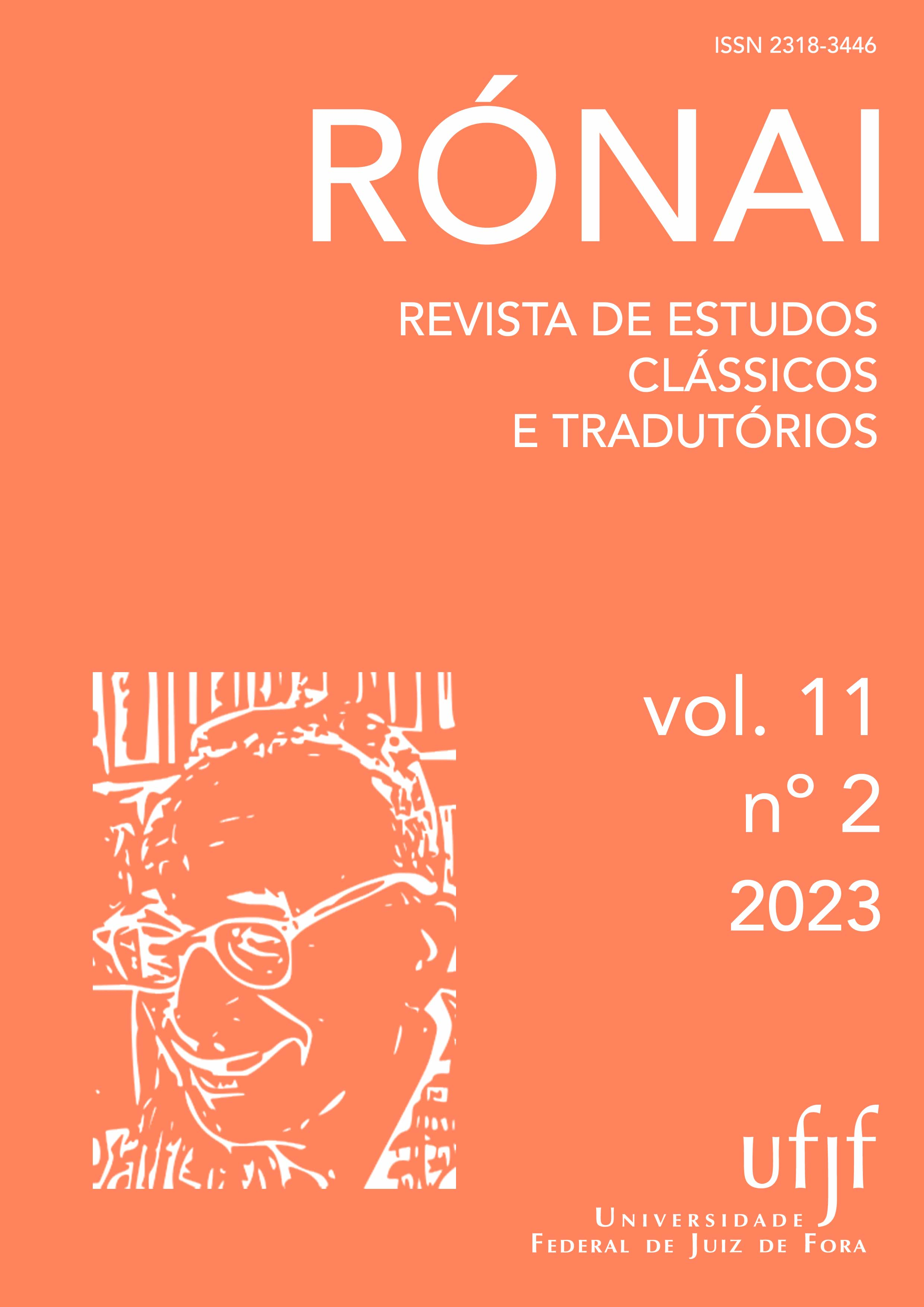The “masculinization” of Clitemnestra in Aeschylus’ Agamemnon
DOI:
https://doi.org/10.34019/2318-3446.2023.v11.40635Keywords:
Oresteia, Clytemnestra, Aeschylus, Agamemnon, NarrativeAbstract
Throughout the entire tragedy Agamemnon, Aeschylus carries out the gradual process of “masculinization” of Clytemnestra. Several characteristics then considered masculine are attributed to her. It is a narrative construction to characterize Clytemnestra as the example of a “bad wife”, as Agamemnon's damned soul curses her in the Odyssey, and the narrative gradually escalates the characterization until it culminates in Agamemnon's sacrifice. In spite of this, Clytemnestra starts from assumptions typical of the female gender. Supported by the analysis of the original texts and the specialized literature, I argue that Aeschylus' attempt to masculinize Clytemnestra leads to inconsistencies in the heroine's condemnation, as well as raises questions about representations of the feminine, political power relations and the biological origin of life, which are what is at stake in the judgment of Orestes in Eumenides, when Athena determines that Orestes is “the son of the father” in an unsatisfactory Deus ex machina solution.
Downloads
References
ARISTÓTELES. Poética. Tradução de Ana Maria Valente. Lisboa: Calouste Gulbekian, 2004.
CAIRNS, Douglas L. Aidos – the psychology of honor and shame in Ancient Greek literature. New York: Oxford University Press, 1993.
CHESI, Giulia Maria. The play of words – blood ties and power relations on Aeschylus’ Oresteia. Berlim: DeGrutyer, 2014.
D’ARMS, Edward. HULLEY, Karl K. The Oresteia-Story in the Odissey. Transactions and Proceedings of the American Philological Association, vol. 77, 1946, p. 207-213.
DUKE, T.T. Murder in the Bath: Reflections on the Death of Agamemnon. The Classical Journal, v. 49, n. 7, 1954, p. 325-330.
EDWARDS. J. Reading Telemachus Through Orestes: Using the Oresteia to Explain the Odissey. The Classical Outlook, v. 90, n. 1, p. 1-3, 2013.
ÉSQUILO. Oresteia. Tradução de Manuel de Oliveira Pulquério. Lisboa: Edições 70, 2008.
FOLEY, Helene P. Female acts in Greek tragedy. New Jersey: Princeton University Press, 2001.
HOMERO. Odisseia. Tradução: Frederico Lourenço. São Paulo: Penguin Classic Companhia das Letras, 2018.
IRIGARAY, Tiago. O Aidós de Clitemnestra: política e poder no Agamêmnon, de Ésquilo. Rónai – Revista de Estudos Clássicos e Tradutórios, Juiz de Fora, v. 6, n. 2, p. 4-14, 2018.
POMEROY, Sarah B. Goddesses, Whores, Wives and Salves: Women in Classical Antiquity. Nova York: Shocken Books, 1995.
SWIFT, Laura. Greek Tragedy – themes and contexts. New York, Bloomsbury, 2016.
TORRANO, Jaa. Agamêmnon. São Paulo: Iluminuras, 2013.
WOOLF, Virginia. Mr. Bennett and Mrs. Brown. Londres: Hogarth Press, 1924.
ZEITLIN, Froma. The Dynamics of Misogyny: Myth and Mythmaking in Aeschylus Oresteia. Arethusa, v. 11, n° 1/2, p. 149-184, 1978.
ZEITLIN, Froma. The Motif of Corrupted Sacrifice in Aeschylus’ Oresteia. Transactions and Proceedings of the American Philological Association. Johns Hopkins University Press, American Philological Association, v. 96, p. 463-508, 1965.
ZYL SMIT, Betine van. Medea The Feminist. Acta Classica: Proceedings of the Classical Association of South Africa. Classical Association of South Africa (CASA), v. 45, 2002, p. 101-122.
Downloads
Published
How to Cite
Issue
Section
License
Copyright (c) 2023 Tiago Irigaray

This work is licensed under a Creative Commons Attribution 4.0 International License.
Copyright
The authors of the published contributions agree with the following items:
1. The authors keep the copyright and convey to the journal the right of first publication, the work being licensed under a Creative Commons Attribution License 4.0 International.
2. The authors are allowed and stimulated to publicize and distribute their work online after the publication in the journal, recognizing first publication in this journal.
3. The authors of the approved works authorize the journal to distribute their content, after publication, for reproduction in content indexes, virtual libraries and similars.
For more information about Creative Commons Attribution License 4.0 International, please, go to: https://creativecommons.org/licenses/by/4.0/deed.en
Editorial exemption
The authors of the published contributions are entirely and exclusively responsible for their contents. Its content does not represent an official position of Rónai - Revista de Estudos Clássicos e Tradutórios neither of Faculdade de Letras da Universidade Federal de Juiz de Fora or their partner institutions.



